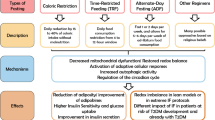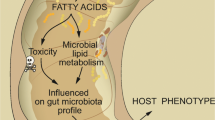Abstract
Several studies have suggested that oxidative stress might cause and aggravate the inflammatory state associated with obesity and could be the link between excessive weight gain and its related disorders such as insulin resistance and cardiovascular diseases. Thus, antioxidant treatment has been proposed as a therapy to prevent and manage obesity and associated complications. Therefore, the aim of the present study was to investigate the effects of supplementation of a standard or high fat diet with the antioxidant lipoic acid (LA) during 56 days, on body weight gain, adiposity, feed efficiency and intestinal sugar absorption, in male Wistar rats. LA supplementation induced a lower body weight gain and adipose tissue size in both control or high fat fed rats accompanied by a reduction in food intake. The group fed on a high fat diet and treated with LA (OLIP group) showed a lower body weight gain than its corresponding Pair-Fed (PF) group (P<0.05), which received the same amount of food than LA-treated animals but with no LA. In fact, LA induced a reduction on feed efficiency and also significantly decreased intestinal α-methylglucoside (α-MG) absorption both in lean and obese rats. These results suggest that the beneficial effects of dietary supplementation with LA on body weight gain are mediated, at least in part, by the reduction observed in food intake and feed efficiency. Furthemore, the inhibitory action of LA on intestinal sugar transport could explain in part the lower feed efficiency observed in LA-treated animals and therefore, highlighting the beneficial effects of LA on obesity.
Resumen
Varios estudios han sugerido que el estrés oxidativo podría actuar como desencadenante y agravante del estado inflamatorio asociado a la obesidad y podría ser un potencial nexo de unión entre la excesiva ganancia de peso y las co-morbilidades asociadas. Así, se ha propuesto el tratamineto con antioxidantes naturales como posible terapia contra el desarrollo de obesidad así como sus complicaciones asociadas. Por ello, el objeto del presente trabajo fue investigar en ratas Wistar macho los efectos de la suplementación de una dieta estándar o alta en grasa con un antioxidante, el ácido lipoico (AL) (0,25g/ 100g de comida) durante 56 días sobre la ganancia de peso corporal, la adiposidad, la eficiencia metabólica y la absorción intestinal de azúcares. La suplementación de la dieta con AL indujo una menor ganacia de peso corporal y redujo el tamaño del tejido adiposo blanco total, tanto en ratas alimentadas con dieta control como alta en grasa. Además, disminuyó la ingesta. La ganancia de peso en el grupo alimentado con dieta alta en grasa y AL fue menor que la de su correspondiente grupoPair-Fed (P<0,05), el cual recibía la misma cantidad de comida que los animales tratados con AL pero sin este ácido. De hecho, la suplementación con ácido lipoico redujo la eficiencia metabólica y disminuyó significativamente la absorción intestinal de α-metilglucósido (α-MG) tanto en ratas control como obesas. Estos resultados sugieren que los efectos beneficiosos de la suplementación de la dieta con AL sobre la ganancia de peso corporal están mediados, al menos en parte, por la reducción observada en la ingesta de comida y en la eficiencia metabólica. Además, la acción inhibitoria del AL sobre el transporte intestinal de azúcares podría explicar, en parte, la menor eficiencia metabólica observada en los animales tratados con AL justificando, por consiguiente, los efectos beneficiosos del AL sobre la obesidad.
Similar content being viewed by others
References
Barbany, M., F.M. (2002): Obesity: concept, classification and diagnosis.An Sist Sanit Navar,25, 7–16.
Buettner, R., S.J., Bollheimer L.C. (2007): Highfat diets: modeling the metabolic disorders of human obesity in rodents.Obesity (Silver Spring),15, 798–808.
Cakatay, U. (2006): Pro-oxidant actions of alpha-lipoic acid and dihydrolipoic acid.Med Hypotheses,66, 110–117.
Cho KJ, M.H., Moini, H, Packer L, Yoon DY, Chung AS. (2003): α-lipoic Acid Inhibits Adipocyte Differentiation by Regulating Proadipogenic Transciption Factors via Mitogen activated Protein Kinase Pathways.J Biol Chem,278, 34823–34833.
Chung, H.Y., K.H., Kim JW, Yu BP (2001): The inflammation hypothesis of aging: molecular modulation by calorie restriction.Ann NY Acad Sci,928, 327–335.
García-Díaz D., C.J., Milagro F.I., Martínez J.A. (2007): Adiposity dependent apelin gene expression: relationships with oxidative and inflammation markers.Mol Cell Biol,305, 87–94.
García-Díaz D.F., C.J., Milagro F.I., Paternain L., Solomon A., Martínez J.A. (2009): Ascorbic acid oral treatment modifies lipolytic response and behavioural activity but not glucocorticoid metabolism in cafeteria diet-fed rats.Acta Physiol (Oxf),195, 449–457.
Hotamisligil, G. (2003): Inflammatory pathways and insulin action.Int J Obes Relat Metab Disord,27, S53-S55.
Iñigo C., Barber A., Lostao M.P. (2004): Leptin effect on intestinal galactose absorption inob/ob anddb/db mice.J Physiol Biochem,60, 93–98.
Jebelovszki E, K.C., Erdei N., Feher A., Pasztor E.T., Rutkai I.,et al., (2008): High-fat diet-induced obesity leads to increased NO sensitivity of rat coronary arterioles: role of soluble guanylate cyclase activation.Am J Physiol Heart Circ Physiol,294, H2558-H2564.
Keaney J.F., Jr., L.M., Vasan R.S., Wilson P.W., Lipinska I., Corey D., Massaro J.M., Sutherland P., Vita J.A., Benjamin E.J. (2003): Obesity & systemic oxidative stress: clinical correlates of oxidative stress in the Framingham Study.Arterioscler Thromb Vasc Biol,23, 434–439.
Kim, M.P., J.Y. Namkoong, C. Jang, P.G. Ryu, J.W. Song, H.S. Yun, J.Y. Namgoong, I.S. Ha, J. Park, I.S. Lee, I.K. Viollet, B. Youn, J.H. Lee, H.K. Lee, K.U. (2004): Anti-obesity effects of alpha-lipoic acid mediated by suppression of hypothalamic AMP-activated protein kinase.Nat Med,10, 727–733.
Levetan C. (2007): Oral antidiabetic agents in type 2 diabetes.Curr Med Res Opin,23, 945–952.
Mitra M.S., D.S., White B., Mehendale H.M. (2008): High fat diet-fed obese rats are highly sensitive to doxorubicin-induced cardiotoxicity.Toxicol Appl Pharmacol,231, 413–422.
Packer, L., K.K., Rimbach G. (2001): Molecular aspects of lipoic acid in the prevention of diabetes complications.Nutrition,17, 888–895.
Padmalayam, I., H.S., Pillarisetti S. (2009): Lipoic acid synthase (LASY): A novel role in inflammation mitochondrial function and insulin resistance.Diabetes,58, 600–608.
Pérez-Matute P. P.-E.N., Martínez J.A., Martí A., Moreno-Aliaga M.J. (2007): Eicosapentaenoic acid actions on adiposity and insulin resistance in control and high-fat-fed rats: role of apoptosis, adiponectin and tumour necrosis factor-alpha.Br J Nutr,97, 389–398.
Purnell J.Q., H.I. (1997): New oral therapies for type 2 diabetes.Am Fam Physician,56, 1835–1842.
Sena C.M., N.E., Louro T., Proença T., Fernandes R., Boarder M.R.et al. (2008): Effects of α-lipoic acid on endothelial function in aged diabetic and high-fat fed rats.Br J. Pharmacol,153, 894–906.
Shen QW, J.C., Kalchayanand N., Zhu M.J., Du M. (2005): Effect of dietary α-lipoic acid on growth, body composition, muscle pH, and AMP-activated protein kinase phosphorylation in mice.J Anim Sci,83, 2611–2617.
Shimizu M., K.Y., Suzuki M., Satsu H., Miyamoto Y. (2000): Regulation of intestinal glucose transport by tea catechins.Biofactors,13, 61–65.
Smith A.R., S.S., Widlansky M., Suh J.H., Hagen T.M. (2004): Lipoic acid as a potential therapy for chronic diseases associated with oxidative stress.Curr Med Chem,11, 1135–1146.
Song K.H., L.W., Koh J.M., Kim H.S., Youn J.Y., Park H.S.,et al., (2005): α-lipoic acid prevents diabetes mellitus in diabetes-prone obese rats.Biochem Biophys Res Commun,326, 197–202.
Vincent, H., Taylor, A.G. (2006): Biomarkers and potential mechanisms of obesity-induced oxidant stress in humans.Int J Obes,30, 400–418.
Wolfram S., W.Y., Thielecke F. (2006): Antiobesity effects of green tea.Mol Nutr Food Res,50, 176–87.
Yang R.L., L.W., Shi Y.H., Le G.W. (2008): Lipoic acid prevents high-fat diet-induced dyslipemia and oxidative stress: a microarray analysis.Nutrition,24, 582–588.
Author information
Authors and Affiliations
Corresponding author
Rights and permissions
About this article
Cite this article
Prieto-Hontoria, P.L., Pérez-Matute, P., Fernández-Galilea, M. et al. Lipoic acid prevents body weight gain induced by a high fat diet in rats: Effects on intestinal sugar transport. J. Physiol. Biochem. 65, 43–50 (2009). https://doi.org/10.1007/BF03165968
Received:
Issue Date:
DOI: https://doi.org/10.1007/BF03165968




